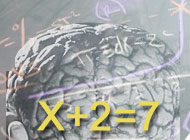Mathematics is all in the brain

A Swiss scientist has challenged conventional views on mathematics in a controversial bestseller in the United States.
Rafael Nunez, a psychologist at Fribourg University, and his co-author, George Lakoff, a linguist at the university of California, Berkeley, have shot to prominence with their book, “Where Mathematics Comes From”.
The work challenges the notion that mathematics is the inaccessible language of the universe and contends that all mathematical ideas are elaborate metaphors drawn from human experience.
Nunez and Lakoff explain how arithmetic operations are conceived of in terms of collecting objects, constructing objects, using a measuring stick and moving along a path.
The size of a pile of bricks, for example, suggests a number while a bigger pile suggests a bigger number. The combination of two piles of bricks always results in another pile of bricks. Similar links exist between arithmetic and motion and construction.
The authors say the source of mathematical ideas is not radically different to the source of other, more commonplace notions. They point out that our understanding of algebraic variables is similar to our understanding of pronouns. “Whoever did this was sick” should be compared to “If x+2=7, then x=5”.
According to the theory, basic principles of trigonometry, imaginary numbers and calculus all rely on metaphorical reasoning.
Human beings have an innate ability to do simple arithmetic on quantities of four or less. Yet mathematics is used for designing jets, building bridges, the timing of eclipses, the power of nuclear explosions and the trajectories for sending spaceships to the moon.
The big mystery is why mathematics works so well and how it manages to describe the world so accurately.
Many scientists suspect that the universe has an inherent mathematical structure. Humans have been able to discover these laws in the form of symbols as well as the rules for combining them.
However, Nunez and Lakoff say the world is not ruled by mathematics but by the human brain. Maths is a mere human invention, a means of capturing the way the brain sees the world. It arises out of ordinary cognitive processes.
Critics say the authors have ignored the fact that brains not only observe nature but are also part of nature. They suggest that maths may have played a part in forming the brains in the first place.
Another problem is that mathematics tells of phenomena never previously suspected. Scientists did not discover the particles known as antimatter until after mathematical equations suggested they must exist.
The authors say the book provides an answer to one of the deepest problems of the philosophy of mathematics – how a being with a finite brain and mind can comprehend infinity.
On a more mundane level, they say their work has educational implications, namely there’s a better way to teach maths.
Nunez argues that people who understand the metaphors implicit in mathematics will find the discipline less esoteric and more commonsensical.
by Vincent Landon

In compliance with the JTI standards
More: SWI swissinfo.ch certified by the Journalism Trust Initiative








You can find an overview of ongoing debates with our journalists here . Please join us!
If you want to start a conversation about a topic raised in this article or want to report factual errors, email us at english@swissinfo.ch.